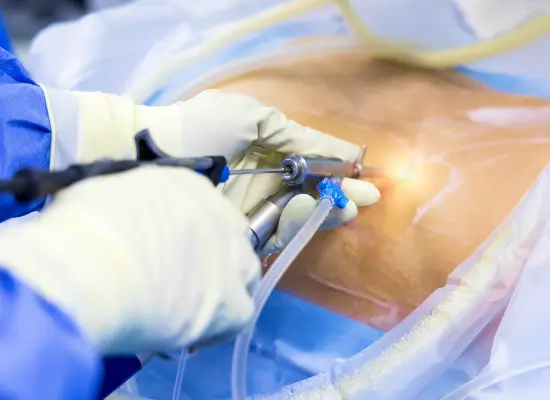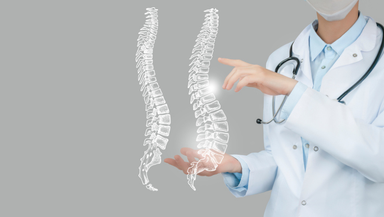The duration of most spine surgery in Bangalore ranges between one to three hours, yet the level of complexity determines specific times.

- Synopsis
- What is Keyhole Spine Surgery?
- Types of Keyhole Spine Surgery
- Conditions Treated with Keyhole Spine Surgery
- Who Can Benefit from Minimally Invasive Spine Surgery?
- Benefits of Keyhole Spine Surgery
- The Procedure: What to Expect
- What Happens After Keyhole Spine Surgery?
- Why Choose Gleneagles Hospitals for Spine Surgery in Bangalore?
- Conclusion
Synopsis
Keyhole surgery is the modern surgical option for patients suffering from serious spinal disorders with unbearable pain that impairs their mobility and lowers their quality of life. Keyhole spine surgery, or minimally invasive spine surgery, gives patients a sophisticated treatment option with much safer outcome results and a noticeably faster recovery period when compared to that of conventional open surgery. Gleneagles Hospitals delivers expert-led treatments using state-of-the-art technologies for spine surgery procedures at our facility in Bangalore. Our hospital is the leading hospital for spine surgery in Bangalore and delivers exact and effective medical care to patients with spinal disorders. This article explains how Gleneagles Hospitals stands as the trusted spine center by illustrating its practices for patient care and rehabilitation following spinal procedures.
What is Keyhole Spine Surgery?
Keyhole spine surgery, or minimally invasive spine surgery, is a new surgical technique that treats spinal diseases by making tiny incisions and using specialised instruments. This procedure treats spinal stenosis, herniated discs, and some other degenerative spinal conditions, providing a reduction in pain and also improved quality of life. This technique allows early recovery and reduces postoperative pain since less trauma is inflicted on the muscles and surrounding tissues compared to open surgery.
Types of Keyhole Spine Surgery
Minimally invasive spine surgery (MISS) is a recent advancement in surgical technology that solves some spinal disorders with fewer cuts and less damage to surrounding tissues. Different types of keyhole spine surgeries may be preferred depending on the specific medical conditions of each patient. Here are:
- Microdiscectomy: This procedure is mostly performed to remove a herniated lumbar disc. A bulging disc is treated by excising a portion that compresses nearby nerves, thereby relieving pain, numbness, and weakness in the legs.
- Spinal Decompression Surgery: This is mostly conducted for spinal stenosis, a condition in which the narrowing of the spinal canal compresses the nerves. The surgeon carefully obliterates the bone formation or ligament that narrows the spinal canal so as to strengthen the back and eliminate chronic pain.
- Percutaneous Spinal Fusion: Through the use of specialised tools and tiny incisions, this technique joins two or more vertebrae to stabilise the spine. In most cases, it is recommended for ailments like spinal instability or degenerative disc disease.
- Endoscopic Spine Surgery: Utilising an endoscope, which is a tiny camera, this extremely advanced method provides a high-quality, enlarged image of the spinal structures. To reduce scarring and shorten the duration of hospital stays, they are typically used to treat disc herniations, spinal stenosis, and other spinal conditions.
- Kyphoplasty & Vertebroplasty: The various procedures are used to treat vertebral compression fractures, usually resulting from spinal injuries or osteoporosis. The balloon insertion procedure creates space during kyphoplasty before the surgeons inject bone cement for construct stabilisation. The purpose of vertebroplasty medical procedure is to directly insert bone cement into fracture areas, thus making bones stronger while improving pain management and restoring movement capability.
To ensure the finest outcomes for our patients, we at Gleneagles Hospitals, Bangalore's leading spine surgery centre, provide these state-of-the-art, minimally invasive techniques.
Conditions Treated with Keyhole Spine Surgery
This is an advanced treatment that is employed to address a variety of spinal problems, like as
- Herniated Discs: A disorder in which a spinal disc's soft inner material protrudes through its hard outer shell, squeezing nerves.
- Spinal Stenosis: Narrowing of the spinal canal can cause nerve compression, resulting in discomfort, numbness, and weakness in the arms or legs.
- Spondylolisthesis: When one vertebra slips forward over another, it can cause instability, back discomfort, and irritation of the nerves.
- Spinal Tumours: Anomalies that may compress the nerves or spinal cord, causing excruciating pain and issues with coordination.
- Fractures and Deformities: Spinal injuries or misalignments can result in long-term discomfort and incapacity. By using keyhole procedures, these irregularities may be fixed with the least amount of disturbance to nearby buildings.
- Degenerative Disc Disease: A disease where the spinal discs gradually deteriorate, causing discomfort and reduced range of motion.
- Sciatica: Sciatic nerve compression, which causes discomfort that travels into the legs from the lower back.
Gleneagles Hospitals, leading hospital for spine surgery in Bangalore, offers specialised treatment plans for a range of spinal diseases to patients seeking spine surgery in Bangalore.

Your health matters – get expert advice today.
Who Can Benefit from Minimally Invasive Spine Surgery?
Your spine surgeon will take into consideration a number of important criteria in determining whether you will make a good candidate for minimally invasive spine surgery. One of the most important points to keep in mind is whether the affected part of your spine can be reached via small incisions. Usually, only people who have not improved with more conservative approaches, such as medicine, physical therapy, or injections, are candidates for this kind of surgery. Surgeries are available if all other treatment modalities fail to relieve your symptoms.
Minimally invasive spine surgery in Bangalore is most effective when the surgeon is able to use the diagnostic imaging capabilities to identify the exact source of your problems. Having a very targeted approach will limit tissue damage, shorten healing time, and reduce postoperative discomfort by removing the need for a large incision. Patients who opt for minimally invasive spine surgery can have effective pain alleviation, increased mobility, and a speedier return to their regular daily activities.
Benefits of Keyhole Spine Surgery
When choosing minimally invasive spine surgery in Bangalore, patients gain many significant benefits:
- Smaller Incisions: Reduces blood loss and risk of infection.
- Less Muscle Damage: The procedure protects neighboring tissues which speeds up recovery time.
- Minimal Scarring: The surgical cuts remain minimal because these procedures result in fewer visible scars.
- Faster Recovery: The recovery time shortens while patients spend less time in hospitals before returning to their normal routines.
- Reduced Postoperative Pain: They depend less on pain medication.
- Lower Risk of Complications: The surgical approach provides superior safety outcomes than traditional open procedures
The Procedure: What to Expect
How Should I Prepare for Keyhole Spine Surgery?
Before keyhole surgery on a spine, your surgeon will conduct a physical examination and proceed to imaging tests like MRIs, CT scans, or X-rays to assess the area of the affected spine.
Your surgeon will provide detailed pre-operative instructions, which may entail:
- More testing is being done to get a diagnosis and formulate a surgical plan.
- Giving up smoking will promote recovery and reduce the likelihood of problems.
- Participating in routine exercise during the surgery to preserve muscle mass and enhance post-operative rehabilitation.
- Changes to your medication based on your past medical history. This might include starting antibiotics or stopping non-urgent medications and supplements that can prevent recovery.
- Following the dietary guidelines for the food and liquids consumed the night before surgery.
What Happens During Surgery?
On the day of the procedure:
- Anaesthesia Administration: Depending on the procedure, an anaesthesiologist will either provide general anaesthesia, which puts you to sleep, or local anaesthesia, which numbs the region and leaves you awake.
- Small Incisions: Small incisions are made in the skin via the back, chest, or belly.. Insertion of Surgical Instruments: A tubular retractor is passed to open a small working channel.
- In some cases, a camera-equipped endoscope is implanted to enhance visualisation.
Completion of Surgery:
- In order to stabilise vertebrae, release nerves, or remove herniated discs, specialised surgical tools are inserted into the tube.
- The retractor and tools are removed to allow muscles and tissues to return to their natural position. Closing the Wound: Bandages are applied, and stitches or surgical cement are used to seal the wound.
What Happens After Keyhole Spine Surgery?
Following keyhole spine surgery, you will be moved to a recovery room while the anaesthesia wears off. In order to recuperate in a familiar environment, several treatments might be released the same day at home. However, depending on the complexity of the procedure, you may need to stay in the hospital for one or two nights.
Following keyhole spine surgery, you may have some discomfort, but not as much as with standard open surgery since the muscles and tissues are not as severely damaged. Your doctor will provide pain relief medication as treatment. You will receive complete post-operative instructions from the hospital before discharge that teach wound care for the incision site as well as avoidance of specific actions and appointment times for follow-up checks to track your recovery.
Why Choose Gleneagles Hospitals for Spine Surgery in Bangalore?
Gleneagles Hospitals is Bangalore's premier spine surgery hospital and provides:
- Experienced Spine Surgeons: Experts with extensive experience in keyhole spine surgery.
- State-of-the-Art Technology: The medical facility uses cutting-edge technology that offers less intrusive treatment options along with precise therapy through enhanced imaging clarity.
- Personalised Care Plans: Every patient receives customised treatment plans through Personalised Care Plans.
- Comprehensive Rehabilitation Programmes: Dedicated physiotherapy and post-operative support.
- High Success Rates: Consistently excellent outcomes from spine surgery operations.
Gleneagles Hospitals is the premier hospital in Bangalore for sophisticated spine care, including spine surgery.
Conclusion
Conditions affecting the spine should not prevent patients from living their daily lives to the fullest and maintaining their ability to move freely. The keyhole spine surgery treatment delivers excellent outcomes through rapid recovery, reduced discomfort, and superior spinal health benefits to patients. Gleneagles Hospitals, the leading hospital for spine surgery in Bangalore, provides excellent patient care and surgical outcomes because of our minimally invasive spine surgery in Bangalore. To get individualised care that meets your needs, contact our spine surgery specialists at our Bangalore facility.
Our Doctors
View allDr Naveen M A
HOD & Sr Consultant - Minimal Access Brain and Spine Surgery
MBBS, MS, MCh (Neuro), FMAS, FMISS (Seoul), FASS (USA), Fellow Skull base Endoscopy (USA)
Frequently Asked Questions
The surgical procedure takes place under anaesthesia, making the postoperative discomfort from open surgery reduction possible.
The medical staff encourages patients to engage in walking activities as soon as 24 hours following their operation.
Yes, by using sophisticated navigation systems, robotic systems let surgeons perform accurate spine surgery procedures while lowering surgical risks and improving clinical outcomes.
Our Gleneagles Hospitals deliver successful outcomes at high rates, with decreased complications and improved patient recovery results.
















